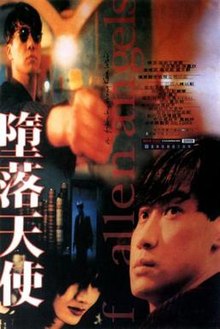
Back Fallen Angels (pel·lícula) Catalan Fallen Angels (1995) German Fallen Angels (película) Spanish فرشتگان سقوطکرده (فیلم ۱۹۹۵) Persian Fallen Angels (vuoden 1995 elokuva) Finnish Les Anges déchus (film, 1995) French Fallen Angels (film 1995) ID Angeli perduti Italian 天使の涙 Japanese 타락천사 (1995년 영화) Korean
| Fallen Angels | |||||||||||
|---|---|---|---|---|---|---|---|---|---|---|---|
 Hong Kong theatrical poster | |||||||||||
| Chinese name | |||||||||||
| Traditional Chinese | 墮落天使 | ||||||||||
| Simplified Chinese | 堕落天使 | ||||||||||
| Literal meaning | Fallen angels | ||||||||||
| |||||||||||
| Directed by | Wong Kar-wai | ||||||||||
| Written by | Wong Kar-wai | ||||||||||
| Produced by | Jeffrey Lau | ||||||||||
| Starring | |||||||||||
| Cinematography | Christopher Doyle | ||||||||||
| Edited by |
| ||||||||||
| Music by | Roel A. Garcia Frankie Chan | ||||||||||
Production company | Jet Tone Productions | ||||||||||
| Distributed by | Kino International | ||||||||||
Release date |
| ||||||||||
Running time | 96 minutes[1] | ||||||||||
| Country | British Hong Kong | ||||||||||
| Languages | Cantonese Mandarin | ||||||||||
| Box office | HK$7.5 million (Hong Kong) US$0.2 million (US)[2] | ||||||||||
Fallen Angels is a 1995 Hong Kong neo-noir crime comedy-drama film[3][4] written and directed by Wong Kar-wai. It features two intertwined storylines—one tells the story of a hitman wishing to leave the criminal underworld (Leon Lai), the prostitute he starts a relationship with (Karen Mok), and his agent (Michelle Reis), who is infatuated with him. The other story is of a mute ex-convict on the run from the police (Takeshi Kaneshiro) and a mentally unstable woman dumped by her boyfriend (Charlie Yeung). Set in 1995 pre-Handover Hong Kong, Fallen Angels explores the characters' loneliness, their alienation from the situations around them, and yearning for connections in a hectic city.
Wong initially wrote Fallen Angels as the third story of his preceding film, Chungking Express (1994), but split them into two separate projects due to their cumulative length. Similar to Chungking Express, Fallen Angels features a fragmented narrative that emphasises mood and atmosphere over structure. Whereas its predecessor incorporates bright daytime colours, Fallen Angels consists of scenes exclusively shot at night and using darker colours alongside bright neons. Wong considered the two movies to be complementary counterparts exploring contemporary Hong Kong. Cinematographer Christopher Doyle extensively used wide-angle lens to distort the characters' faces on the screen, conveying their isolation from the surrounding world. Doyle also creates distorted tension in scenes of extreme violence with frantic, out-of-focus visuals. The soundtrack extensively uses trip hop and pop songs to convey mood and maintain an "urban environment" that plays with popular culture.
Fallen Angels was released in September 1995. Upon release, critics commented that its styles resembled those deployed in Chungking Express; many lamented that Wong had become self-indulgent, though as time went on critics began to be more appreciative of the film. At the 15th Hong Kong Film Awards in 1996, it won three awards: Best Supporting Actress for Mok, Best Cinematography for Doyle, and Best Original Score for Roel A. Garcia and Frankie Chan. Retrospectively, critics commented that though Fallen Angels was not as groundbreaking as its predecessor, it remained one of Wong's most captivating films, cementing his trademark styles. The film's abstract, unconventional style, the context in which it was made, and its use of pastiche and intertextuality with regards to both popular culture and its predecessor Chungking Express have led to the movie being described as a postmodern film and as suggesting a postmodern reading.
Since its release, Fallen Angels has encompassed a large cult following, and is notable for being the last film Wong fully shot in his native Hong Kong before embarking on more ambitious international productions.[5]
- ^ "Fallen Angels". British Board of Film Classification. Retrieved 14 December 2017.
- ^ Fallen Angels, Box Office Mojo, Retrieved 22 July 2011
- ^ BBFC. "Fallen Angels". www.bbfc.co.uk. Retrieved 28 February 2022.
- ^ Dalton, Stephen. "Films on TV Choice". The Times. ISSN 0140-0460. Retrieved 28 July 2022.
- ^ "How Wong Kar-wai's 'Restoration' of "Fallen Angels" Spoils Pre-1997 Hong Kong". Cinema Escapist. 23 January 2021. Retrieved 18 September 2022.